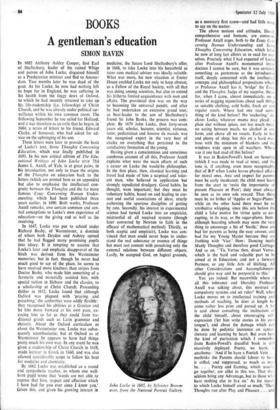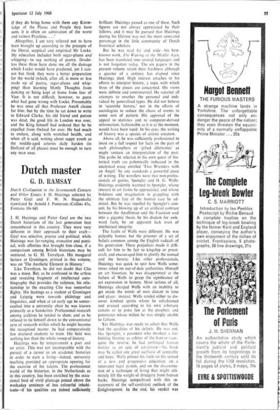A gentleman's education BOOKS
SIMON RAVEN
In 1682 Anthony Ashley Cooper, first Earl of Shaftesbury, leader of the ruined Whigs and patron of John Locke, disguised himself as a Presbyterian minister and fled to Amster- dam. Two months later he was dead of the gout. As for Locke, he now had nothing left to hope for in England, he was suffering in his health from the foggy dews of Oxford, to which be had recently returned to take up his life-studentship (i.e. fellowship) of Christ Church, and he was already under political sur- veillance within his own common room. The following September he too sailed for Holland; and it was therefore as an exile that he began, in 1684, a series of letters to his friend, Edward Clarke, of Somerset, who had asked for ad- vice on the upbringing of his son.
These letters were later to provide the basis of Locke's text, Some Thoughts Concerning Education, which was finally published in 1693. In his new critical edition of The Edu- cational Writings of John Locke (cur 75s) James L. Axte11, of Yale, is at great pains, in his introduction, not only to trace the origins of the Thoughts on education back to the letters (which are printed here as an appendix) but also to emphasise the intellectual con- gruity between the Thoughts and the far more famous Essay Concerning Human Under- standing, which had been published three years earlier, in 1690. Both works, Professor Axtell remarks, owe certain common and cen- tral conceptions to Locke's own experience of education—on the giving end as well as the receiving.
In 1647, Locke was put to school under Richard Busby, of Westminster, a dominie of whom both Dryden and Aubrey opined that he had flogged many promising pupils into idiocy. It is tempting to assume that Locke's later and emphatic disapproval of the birch was derived from his Westminster memories; but in fact, though he never had much good to say of the place, he seems to have received more kindness than stripes from Doctor Busby, who made him something of a favourite and materially assisted him, with special tuition in Hebrew and the classics, to a scholarship at Christ Church. Proceeding thither in 1652, Locke found that although Oxford was plagued with 'praying and preaching,' the authorities were oddly flexible: they recognised his abilities as a Grecian and let him move forward at his own pace, ex- cusing him so far as they could from tra- ditional grinds such as Latin grammar and rhetoric. About the Oxford curriculum as about the Westminster one, Locke was subse- quently unenthusiastic; but at Oxford as at Westminster he appears to have had things pretty much his own way. In any event he was given a studentship of Christ Church in 1658, made lecturer in Greek in 1660, and was also allowed considerable scope to follow his bent for medicine and chemistry.
By 1662 Locke was established as a sound and sympathetic teacher, to whom one well- born pupil wrote that 'words are not able to express that love, respect and affection which I have had for you ever since I knew you.' given this, and given his growing interest in medicine, the future Lord Shaftesbury's offer, in 1666, to take Locke into his household as tutor cum medical adviser was ideally suitable. What was more, his new situation at Exeter House enabled Locke not only to keep abreast, as a Fellow of the Royal Society, with all that was doing among scientists, but also to extend his hitherto limited acquaintance with men and affairs. The provincial don was on the way to becoming the universal pundit; and after he had undertaken an extensive grand tour, as bear-leader to the son of Shaftesbury's friend Sir John Banks, the process was com- plete. By 1679 John Locke, then forty-seven years old, scholar, lecturer, scientist, virtuoso, tutor, pediatrician and hom►ne du monde, was the recognised expert in the very best of circles on everything that pertained to the satisfactory formation of the young.
Having given a conscientious and sometimes cumbrous account of all this, Professor Axtell explains what were the main effects of such a career on Locke the would-be philosopher. In the first place, then, classical learning and travel had made of him a sceptical and toler- ant man, who believed in application but strongly repudiated drudgery. Good habits, he thought, were important; but they must be voluntary habits, based on and leading to cor- rect and useful associations of ideas, utterly eschewing the spurious discipline of getting by rote. Secondly, his interest in experimental science had turned Locke into an empiricist, mistrustful of all received systems (though later converted by Newton to faith in the efficacy of mathematical method). Thirdly, as both sceptic and empiricist, Locke was con- vinced that man could never hope to under- stand the real substance or essence of things but must rest content with perceiving only the external relations between different objects. Lastly, he accepted God, on logical grounds,
John Locke in 1685, by Sylvester Brown- over, from the National Portrait Gallery.
as a necessary first cause—and had little more to say on the matter.
The above notions and attitudes, liberal, comprehensive and humane, are common, Professor Axtell urges, both to the Essay Con. cerning Human Understanding and Some Thoughts Concerning Education, which latter he now at long last allows us to read for our. selves. Precisely what I had expected of Locke after Professor Axtell's monumental intro- duction I cannot be sure, but it was certainly something as portentous as the introduction itself, deeply concerned with the intellectual concepts and philosophical propositions which, as Professor Axtell has it, 'bridge' the Essay and the Thoughts. Judge of my surprise, there- for, when I came, almost immediately, on a series of nagging injunctions about such things as suitable clothing, cold baths, fresh air and regular stools. Where had one read some- thing of the kind before? No 'cockering,' de- clares Locke, whatever mama may plead: a plain diet without spices, not too much meat, no eating between meals, no alcohol in any form, and above all no sweets. Early to bed and plenty of sleep, but this on a hard mat- tress with the minimum of blankets and the windows wide open in all weathers. Where was it one had read all this before?
It was in Baden-Powell's book on Scouting (which I was made to read at nine), and the tone is, if anything, even more recognisably that of B-P when Locke leaves physical affairs for moral ones. Awe. and respect for parents must be early inculcated; the child must learn from the start to 'resist the importunity of present Pleasure or Pain'; duty must always be seen as its own sole reward. Thus there must be no bribes of 'Apples or Sugar-Plums,' while on the other hand there must be no retributive whipping, since this sets before the child a false motive for virtue quite as cor- rupting, in its way, as the sugar-plums. Item: although boarding schools may seem the very thing to encourage a bit of 'bustle,' these are bad for parents as being the easy answer, and bad for my Young Master because they are frothing with 'Vice.' Item: Dancing instils Manly Thoughts and therefore good Carriage.
And so on. Vertue then, direct Vertue, which is the hard and valuable part to be aimed at in Education; and not a forward Pertness, or any little Arts of Shifting. All other Considerations and Accomplishments should give way and be postpon'd to this.'
Yes; yes indeed. But meanwhile where is all this tolerance and liberality Professor Axtell was talking about, this mistrust of compulsory systems and set rules? Well, when Locke moves on to intellectual training and methods of teaching, be does at length be- come rather less prim and pursed up. A lot is said about consulting the inclination of the child himself, about encouraging self- expression (get him write stories in his ovs n tongue'), and about the damage which can be done by pedantic insistence on syntax. rhetoric and learning by heart. But even here the kind of puritanism which I remember from Baden-Powell's dreadful book is still massively deployed. Poetry, we learn, 1, anathema: 'And if he have a Poetick Vein ... methinks the Parents should labour to ha it stifled, and suppressed, as much as may be. . . . Poetry and Gaming, which usually go together, are alike in this too, That they seldom bring any Advantage, but to those who have nothing else to live on.' As for travel. to which Locke himself owed so much, 'Their Thoughts run after Play and Pleasure .. . and if they do bring home with them any Know- ledge of the Places and People they have seen, it is often an admiration of the worst and vainest Practices. ...'
Altogether, I am very relieved not to have been brought up according to the precepts of the liberal, sceptical and empirical Mr Locke. My education included both sugar-plums and whipping—to say nothing of poetry. Doubt- less these three haVe done me all the damage which Locke would have predicted, yet I can- not but think they were a better preparation for the world (which, after all, is more or less made up of poetry, sugar-plums and whip- ping) than learning Manly Thoughts from dancing or being kept at home from fear of Vice. It is not difficult, however, to guess what had gone wrong with Locke. Presumably be was once all that Professor Axtell claims for him; but by the time he sat down to write to Edward Clarke, his old friend and patron was dead, the good life in London was over, and the King himself had ordered that he be expelled from Oxford for ever. He had much to endure, along with wretched health; and when all is said, writing about sappy youth as the middle-aged arteries daily harden (in Holland of all places) must be enough to turn any man sour.







































 Previous page
Previous page